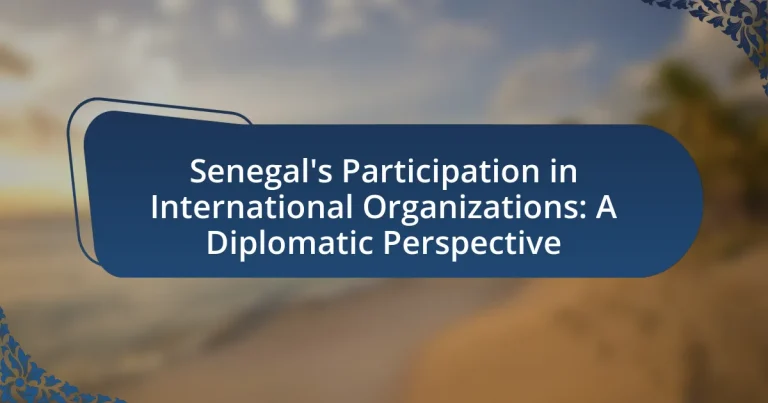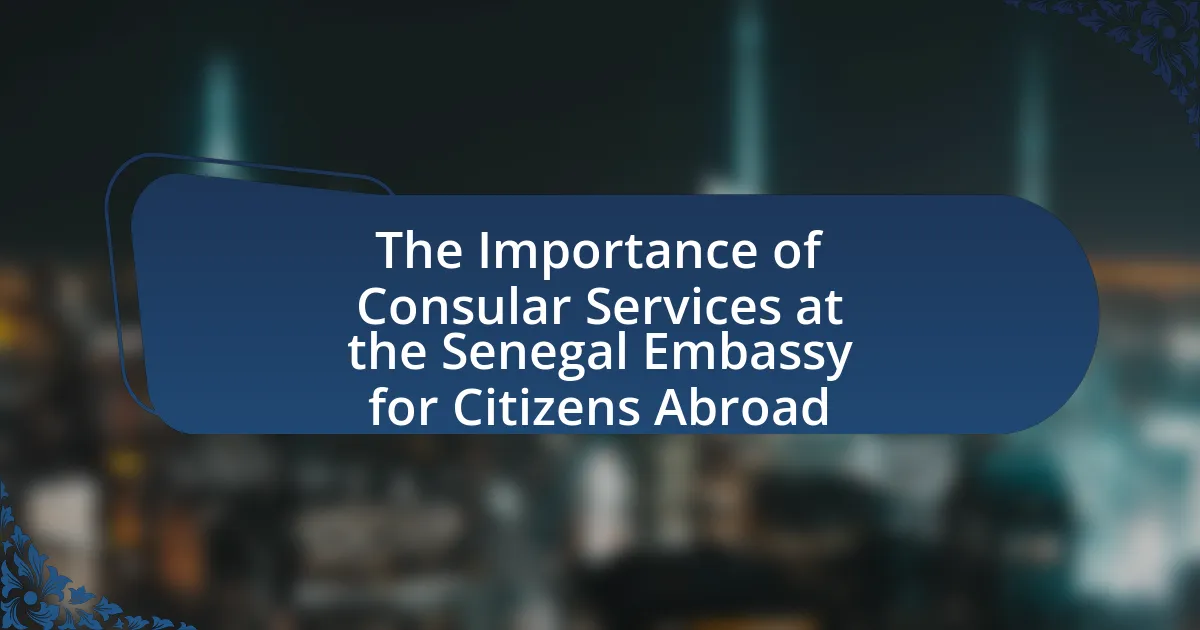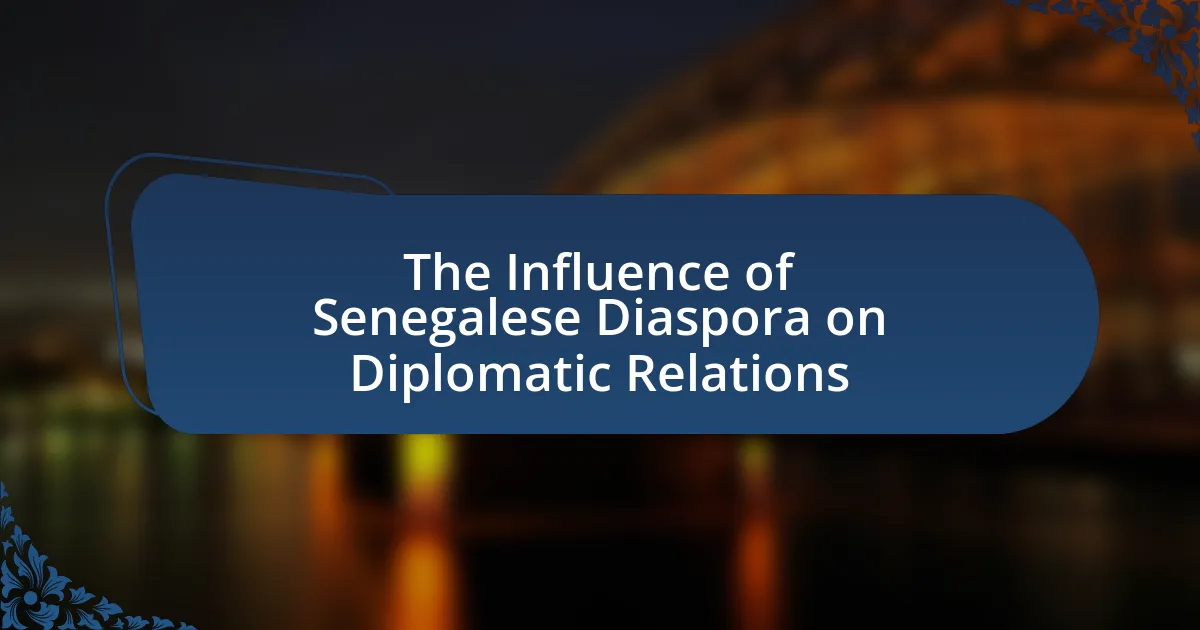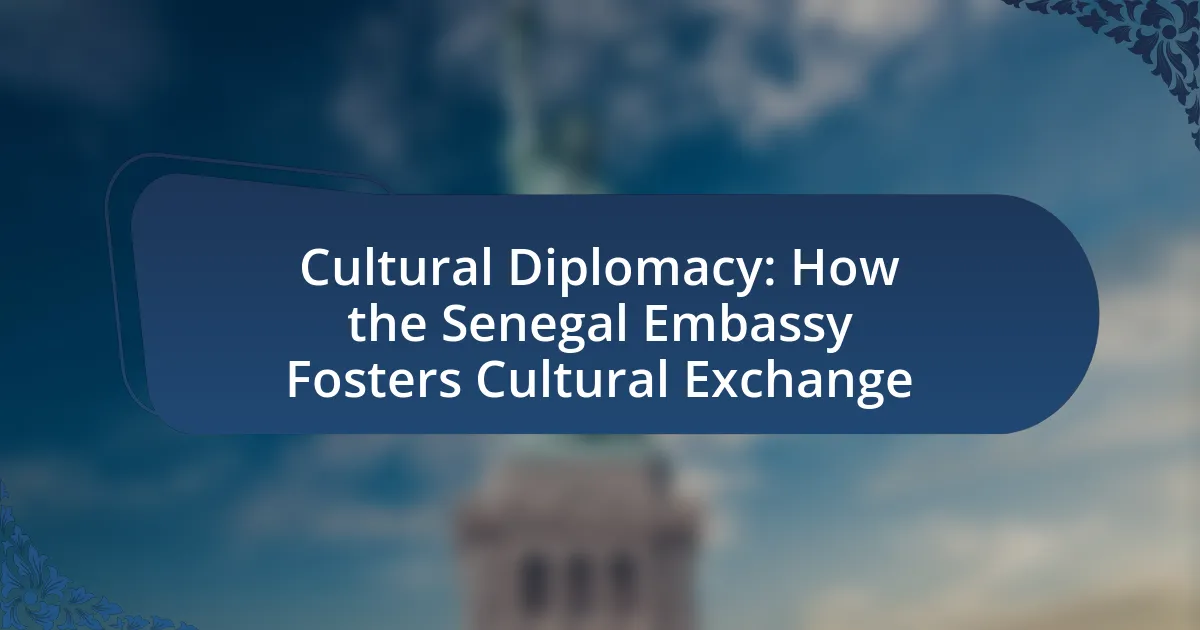Senegal is a prominent participant in various international organizations, including the United Nations, the African Union, and the Economic Community of West African States (ECOWAS). The article examines Senegal’s diplomatic history, highlighting its commitment to multilateralism, peacekeeping, and regional cooperation since gaining independence in 1960. Key events, such as its founding membership in the Organization of African Unity and active involvement in peacekeeping missions, have shaped its international relations. The article also discusses the benefits Senegal gains from these engagements, the challenges it faces in diplomacy, and strategies for enhancing its effectiveness in global forums.
What is Senegal’s Participation in International Organizations?
Senegal actively participates in various international organizations, including the United Nations, the African Union, and the Economic Community of West African States (ECOWAS). As a founding member of the African Union, Senegal plays a significant role in promoting regional integration and peacekeeping efforts. Additionally, Senegal has been a non-permanent member of the UN Security Council, which underscores its commitment to global governance and international peace. The country also engages in multilateral diplomacy through its involvement in organizations such as the Organisation of Islamic Cooperation (OIC) and the Community of Sahel-Saharan States (CEN-SAD), reflecting its strategic interests in regional stability and cooperation.
How has Senegal’s diplomatic history shaped its participation?
Senegal’s diplomatic history has significantly shaped its participation in international organizations by fostering a reputation for neutrality and active engagement in peacekeeping efforts. Since gaining independence in 1960, Senegal has positioned itself as a mediator in regional conflicts, exemplified by its role in the Organization of African Unity and later the African Union. This commitment to diplomacy is further evidenced by Senegal’s contributions to United Nations peacekeeping missions, where it has deployed thousands of troops, reflecting its dedication to international stability and cooperation. Additionally, Senegal’s historical ties with France and its membership in various international bodies, such as ECOWAS and the Non-Aligned Movement, have reinforced its diplomatic influence and collaborative approach in global affairs.
What key events influenced Senegal’s international relations?
Key events that influenced Senegal’s international relations include its independence from France in 1960, which marked the beginning of its diplomatic engagement on the global stage. Following independence, Senegal became a founding member of the Organization of African Unity (OAU) in 1963, emphasizing its commitment to pan-Africanism and regional cooperation. Additionally, Senegal’s active role in the United Nations and its participation in peacekeeping missions have further shaped its international relations. The establishment of diplomatic ties with various countries and involvement in international organizations, such as the Economic Community of West African States (ECOWAS), have also played significant roles in defining Senegal’s foreign policy and international standing.
How has Senegal’s colonial past affected its current diplomatic stance?
Senegal’s colonial past has significantly shaped its current diplomatic stance by fostering a commitment to multilateralism and regional cooperation. The legacy of French colonial rule, which lasted from the 17th century until independence in 1960, instilled in Senegal a strong sense of identity and a desire to assert its sovereignty on the global stage. This historical context has led Senegal to actively participate in international organizations such as the African Union and the United Nations, where it advocates for collective security and development initiatives. Furthermore, Senegal’s experience during colonialism has influenced its diplomatic policies, emphasizing non-alignment and support for decolonization efforts across Africa, as evidenced by its role in the establishment of the Organization of African Unity in 1963.
What are the main international organizations Senegal is involved with?
Senegal is primarily involved with several key international organizations, including the United Nations (UN), the African Union (AU), and the Economic Community of West African States (ECOWAS). The United Nations plays a significant role in Senegal’s diplomatic efforts, as the country has been a member since 1960 and actively participates in various UN peacekeeping missions. The African Union, which Senegal joined in 2001, focuses on promoting unity and cooperation among African states, while ECOWAS, established in 1975, aims to foster economic integration and political stability in West Africa. These organizations reflect Senegal’s commitment to regional and global cooperation.
Which regional organizations play a significant role in Senegal’s diplomacy?
The regional organizations that play a significant role in Senegal’s diplomacy include the Economic Community of West African States (ECOWAS) and the African Union (AU). ECOWAS facilitates regional integration and political stability, while the AU promotes continental unity and cooperation among African nations. Senegal’s active participation in these organizations underscores its commitment to regional security and economic development, as evidenced by its involvement in peacekeeping missions and policy formulation within ECOWAS and the AU.
How does Senegal engage with global organizations like the UN?
Senegal engages with global organizations like the UN through active participation in peacekeeping missions, diplomatic initiatives, and contributions to international development goals. The country has contributed troops to various UN peacekeeping operations, demonstrating its commitment to global security and stability. Additionally, Senegal has hosted significant UN conferences, such as the International Conference on Population and Development in 1994, which underscores its role in shaping international policy. Furthermore, Senegal is a member of various UN bodies, including the Economic and Social Council, where it advocates for sustainable development and regional cooperation in West Africa.
Why is Senegal’s participation in international organizations important?
Senegal’s participation in international organizations is important because it enhances the country’s diplomatic influence and fosters economic development. By engaging in organizations such as the African Union and the United Nations, Senegal can advocate for regional stability, promote peacekeeping efforts, and address global challenges like climate change. Furthermore, Senegal’s active role in these organizations has led to increased foreign investment and development aid, evidenced by its participation in the New Partnership for Africa’s Development, which aims to eradicate poverty and promote sustainable growth across the continent.
What benefits does Senegal gain from its international engagements?
Senegal gains economic, political, and social benefits from its international engagements. Economically, participation in organizations such as the African Union and the Economic Community of West African States facilitates trade agreements and access to funding, enhancing Senegal’s development projects. Politically, these engagements bolster Senegal’s diplomatic influence and stability, as evidenced by its role in peacekeeping missions and conflict resolution in the region. Socially, international partnerships promote cultural exchange and educational opportunities, contributing to human capital development. For instance, Senegal has benefited from various international aid programs that support health and education initiatives, improving the overall quality of life for its citizens.
How does participation enhance Senegal’s economic development?
Participation enhances Senegal’s economic development by fostering international trade, attracting foreign investment, and facilitating access to financial resources. Through active engagement in international organizations such as the African Union and the Economic Community of West African States, Senegal benefits from trade agreements that open markets for its goods, thereby increasing export opportunities. Additionally, participation in these organizations helps Senegal to create a favorable investment climate, as it signals political stability and commitment to economic reforms, which are attractive to foreign investors. For instance, Senegal’s involvement in the International Monetary Fund has led to financial assistance and policy guidance that support economic growth initiatives. These factors collectively contribute to a more robust economy and improved living standards for the population.
What role does international cooperation play in Senegal’s security?
International cooperation is crucial for Senegal’s security as it enhances the country’s ability to address transnational threats and maintain stability. Through partnerships with organizations such as the United Nations and the African Union, Senegal benefits from shared intelligence, joint military exercises, and collaborative peacekeeping efforts. For instance, Senegal has contributed troops to various peacekeeping missions in Africa, demonstrating its commitment to regional security and stability. Additionally, international cooperation facilitates access to resources and training, which strengthens Senegal’s national defense capabilities against terrorism and organized crime.
How does Senegal’s participation influence regional stability?
Senegal’s participation in international organizations significantly enhances regional stability by promoting diplomatic dialogue and conflict resolution. As a member of the Economic Community of West African States (ECOWAS) and the African Union (AU), Senegal actively engages in peacekeeping missions and mediates regional conflicts, such as its involvement in the Gambian political crisis in 2017, which helped restore democratic governance. Additionally, Senegal’s commitment to multilateralism fosters cooperation among West African nations, thereby reducing tensions and encouraging collaborative approaches to security challenges, such as terrorism and organized crime. This proactive stance not only stabilizes Senegal but also contributes to a more secure and cohesive West African region.
What impact does Senegal have on West African diplomacy?
Senegal plays a significant role in West African diplomacy by actively participating in regional organizations such as the Economic Community of West African States (ECOWAS) and the African Union (AU). Its strategic location and stable political environment position Senegal as a mediator in regional conflicts, exemplified by its involvement in peacekeeping missions and diplomatic negotiations, such as the resolution of the political crisis in The Gambia in 2017. Furthermore, Senegal’s commitment to democratic governance and human rights enhances its credibility and influence in promoting stability and cooperation among West African nations.
How does Senegal contribute to peacekeeping efforts in the region?
Senegal contributes to peacekeeping efforts in the region by actively participating in United Nations and African Union missions. The country has deployed thousands of troops to various peacekeeping operations, including in Mali and the Central African Republic, demonstrating its commitment to regional stability. As of 2023, Senegal ranks among the top contributors of troops to UN peacekeeping missions, with over 1,000 personnel deployed. This involvement not only enhances security in conflict zones but also showcases Senegal’s role as a leader in promoting peace and security in West Africa.
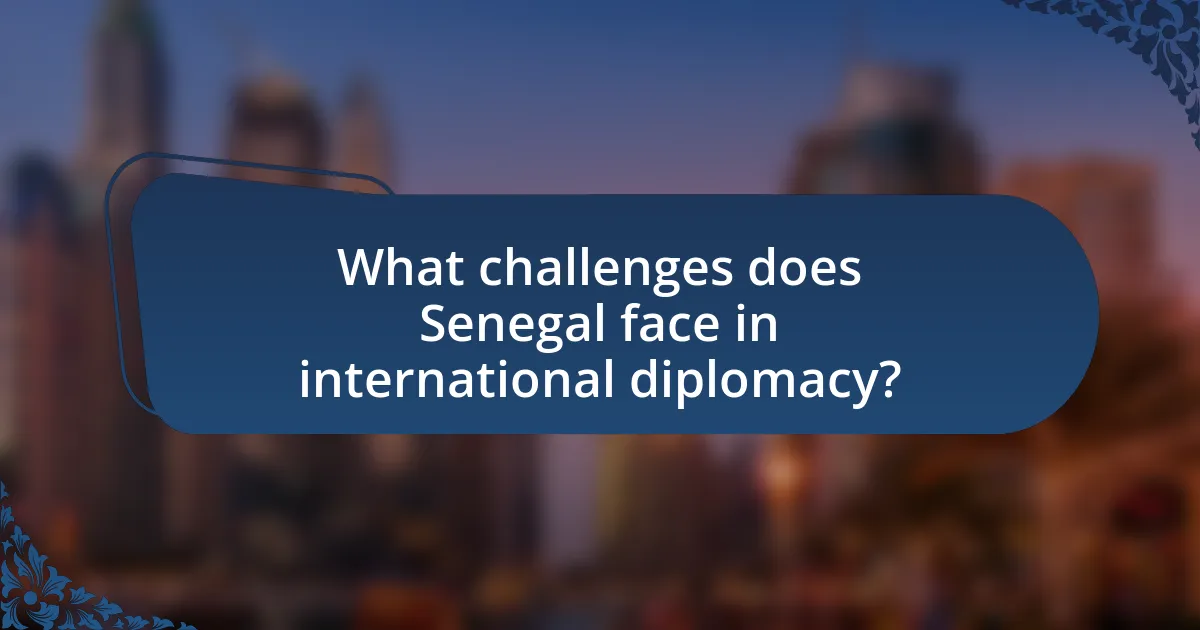
What challenges does Senegal face in international diplomacy?
Senegal faces several challenges in international diplomacy, including limited economic resources, regional instability, and balancing relationships with major powers. The country’s economic constraints hinder its ability to project influence and engage effectively in international forums. Additionally, regional issues, such as conflicts in neighboring countries like Mali and Guinea-Bissau, complicate Senegal’s diplomatic efforts and require careful navigation to maintain stability. Furthermore, Senegal must balance its relationships with major powers, including France and the United States, while also fostering ties with emerging economies, which can create conflicting interests and diplomatic tensions.
What are the limitations of Senegal’s diplomatic influence?
Senegal’s diplomatic influence is limited by its relatively small economy and military capacity compared to larger regional powers. Despite being an active member of international organizations like the African Union and ECOWAS, Senegal’s ability to shape regional policies is often overshadowed by countries such as Nigeria and South Africa, which possess greater economic resources and military strength. Additionally, Senegal’s reliance on foreign aid and investment constrains its diplomatic autonomy, as it must align its foreign policy with the interests of donor nations. These factors collectively hinder Senegal’s capacity to exert significant influence on the global stage.
How do economic constraints affect Senegal’s international commitments?
Economic constraints significantly limit Senegal’s ability to fulfill its international commitments. These financial limitations hinder the country’s capacity to allocate sufficient resources for participation in international organizations and initiatives. For instance, Senegal’s GDP growth has been affected by external shocks and domestic challenges, leading to budgetary restrictions that impact its diplomatic engagements. Consequently, the government may prioritize domestic needs over international obligations, resulting in reduced participation in global forums and initiatives aimed at addressing issues like climate change and security. This dynamic illustrates how economic realities directly shape Senegal’s foreign policy and international relations.
What political challenges hinder Senegal’s participation in global forums?
Senegal faces political challenges such as governance issues, political instability, and limited diplomatic influence that hinder its participation in global forums. Governance issues, including corruption and lack of transparency, undermine the country’s credibility on international platforms. Political instability, marked by protests and opposition movements, distracts from diplomatic efforts and reduces engagement in global discussions. Additionally, Senegal’s limited diplomatic influence, stemming from its relatively small economy and military capacity compared to larger nations, restricts its ability to shape global agendas effectively. These factors collectively diminish Senegal’s role and effectiveness in international organizations.
How can Senegal improve its effectiveness in international organizations?
Senegal can improve its effectiveness in international organizations by enhancing diplomatic engagement and capacity-building initiatives. Strengthening its diplomatic corps through training and resources will enable Senegal to better advocate for its interests and influence decision-making processes. For instance, investing in specialized training programs for diplomats can lead to more effective negotiations, as evidenced by successful outcomes in previous UN resolutions where well-prepared representatives secured favorable terms for their nations. Additionally, fostering partnerships with other member states can amplify Senegal’s voice in international forums, as demonstrated by collaborative efforts in regional organizations like ECOWAS, which have historically increased collective bargaining power.
What strategies can Senegal adopt to enhance its diplomatic presence?
Senegal can enhance its diplomatic presence by actively participating in international organizations and fostering bilateral relations with key global players. By increasing its involvement in organizations such as the African Union and the United Nations, Senegal can leverage its position to advocate for regional issues and gain visibility on the global stage. Additionally, establishing strategic partnerships with countries like France and the United States can facilitate economic and political support, further solidifying Senegal’s diplomatic influence. Historical context shows that Senegal’s role as a mediator in regional conflicts, such as in Guinea-Bissau, has already positioned it as a credible diplomatic actor, demonstrating the effectiveness of these strategies.
How can Senegal leverage partnerships for better outcomes?
Senegal can leverage partnerships for better outcomes by actively engaging in regional and international organizations to enhance economic development and political stability. By participating in entities such as the African Union and ECOWAS, Senegal can collaborate on shared goals, access funding, and benefit from knowledge exchange. For instance, Senegal’s involvement in the African Development Bank has facilitated infrastructure projects that boost trade and investment, demonstrating the tangible benefits of such partnerships. Additionally, partnerships with countries like France and China have led to significant investments in sectors like energy and agriculture, further solidifying Senegal’s economic growth and resilience.
What practical steps can Senegal take to strengthen its international role?
Senegal can strengthen its international role by actively enhancing its participation in multilateral organizations and fostering regional cooperation. By increasing its engagement in the African Union and the Economic Community of West African States, Senegal can play a pivotal role in addressing regional challenges such as security and economic development. Furthermore, hosting international conferences and summits can elevate Senegal’s profile on the global stage, showcasing its commitment to diplomacy and collaboration. For instance, Senegal’s successful hosting of the 2021 Dakar International Forum on Peace and Security highlighted its capacity to facilitate dialogue on critical issues. Additionally, strengthening bilateral relations with key global powers through trade agreements and cultural exchanges can further solidify Senegal’s influence internationally.
